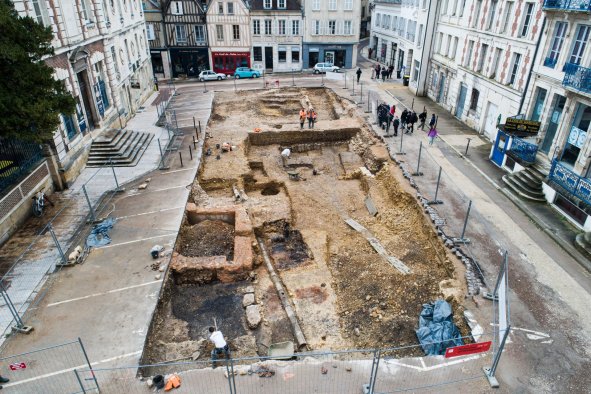A remarkable ancient site on the tiny Greek island of Delos is "doomed to disappear" within decades due to rising sea levels and geological processes, an expert has said.
While it only covers an area of roughly 1.3 square miles, Delos is considered to be one of the most important places in the ancient Greek world.
The rocky island, part of the Cyclades archipelago in the Aegean Sea, was first settled in the 3rd millennium B.C. But in the 1st millennium B.C., it became a major religious center and prosperous trading hub.
In ancient Greek mythology, the island is said to be the birthplace of Apollo—one of the most important Hellenic gods—and his twin sister Artemis. Such was its religious significance, that in the 3rd century B.C., the ancient Greek poet Callimachus described Delos as the "most sacred" of all islands.
The sanctuary of Apollo—thought to have been established since at least the 9th century B.C.—attracted pilgrims from all over the ancient Greek world to the island.
After 167 B.C., when Delos was declared a free port, the island became one of the most important commercial trading centers in the region for a time, attracting merchants, bankers and shipowners from all over the ancient world—not to mention builders, artists and craftsmen who built luxurious houses for them.
But after being attacked and looted twice—in 88 B.C. and 69 B.C.—the island fell into decline and was gradually abandoned.
Today, Delos is largely uninhabited, save for a handful of researchers, guardians and other individuals whose work is focused on the protection and conservation of the archaeological remains.
The entire island is a protected archaeological site—one which receives tens of thousands of visitors each year. In 1990, Delos was granted World Heritage status by UNESCO.
Among the island's notable ruins are the remains of a Hellenistic settlement, the Sanctuary of Apollo and the iconic Terrace of the Lions statues.
But the archaeological remains on the island face an uncertain future in the face of global climate change, which is causing sea levels to rise around the world.
Véronique Chankowski, director of the French School of Athens (EFA), which has been conducting excavations on Delos for roughly 150 years, told AFP that the island's archaeological park is "doomed to disappear" in 50 years or so.
"This archaeological park that today provides us with considerable information [about the ancient world], we may not see again," Chankowski told AFP.
In the Mediterranean basin—in which the Aegean Sea lies—sea level has risen at an average rate of around 2.8 millimeters per year in recent decades.
Delos is also facing an additional problem—the island is progressively sinking due to the movements of tectonic plates in the region.
According to Chankowski, the shoreline on Delos has advanced up to roughly 65 feet—depending on the location—in the space of almost 10 years, as a result of these two factors.
In one area of the archaeological park, the extent of the damage caused by the rising sea is clearly evident. This area contains the remains of old shops that were places of commercial exchange in the 2nd and 1st centuries B.C.
"Water enters the shops in winter and corrodes the base of the walls" which "collapse suddenly," Jean-Charles Moretti, director of the French archaeological mission on Delos, who has been carrying out research on the island for 40 years, told AFP. "Every year in the spring, I notice that new walls have collapsed."
According to Chankowski, some emergency measures have been enacted to reinforce certain walls, but long-term solutions to protecting vulnerable remains are "extremely complex" and will require a "multidisciplinary approach," she said.
Do you have a tip on a science story that Newsweek should be covering? Do you have a question about archaeology? Let us know via science@newsweek.com.
Disclaimer: The copyright of this article belongs to the original author. Reposting this article is solely for the purpose of information dissemination and does not constitute any investment advice. If there is any infringement, please contact us immediately. We will make corrections or deletions as necessary. Thank you.


